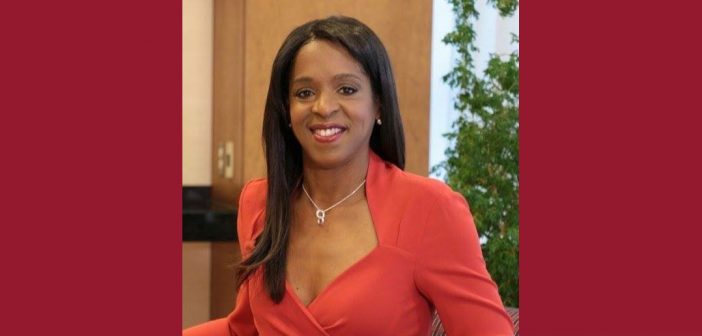After working on Wall Street for a few years and then reporting on it for more than a decade on CNN, CBS, and elsewhere, Stacey Tisdale saw how people’s attitudes about money can affect their own well-being.
“I saw how much pain and suffering people’s financial lives are causing [them],” she said, despite their efforts to stick to a budget and “create financial security.”
Tisdale, a 1988 graduate of Marymount College (the Tarrytown, New York, women’s college that was part of Fordham University from 2002 until it closed in 2007), said she felt many financial experts were overlooking—or underestimating—the “psychological and emotional toll of financial stress.” She saw a disconnect between consumers’ good intentions and “how our economic system works.”
She wanted to get down to root causes, so she spent six years researching consumers’ financial behavior, interviewing experts such as clinical psychologist James Prochaska, Ph.D., and collaborating with financial adviser Paula Boyer Kennedy to write a book, The True Cost of Happiness: The Real Story Behind Managing Your Money (Wiley, 2007).
One of the things she found is that our financial decisions can “really reflect … where you are—and if you’re not living in step with your priorities.”
“Money’s almost like a palm reader,” she said. “You learn a lot about someone if you look at their financial choices, their financial life.”
Tisdale wrote The True Cost of Happiness to help people bring their decisions in line with their priorities. She plans to share some of that wisdom during the fifth annual Fordham Women’s Summit, to be held virtually on Wednesday, Oct. 20. (Update: Watch Tisdale’s address at the Summit.)
She also wants to draw on her personal story to help attendees examine the various experiences and influences that have shaped their financial lives.
“For me, experiences that I’ve had—being born a Black woman, growing up with a privileged life and finding myself a lot of times in racial isolation, and trying to build career as a Black female financial journalist—I didn’t really feel like I fit into any group, and so I had to look deeper into dimensions of myself,” she said, to understand how all of those things affected her approach to money and to making financial decisions in line with her priorities.
The True Cost of Happiness was published in late 2007, right at the start of the Great Recession, which inspired many people and groups to contact Tisdale for advice. The White House asked her to develop a behavior-based financial education program for students at historically Black colleges and universities.
“That’s maybe where my lightbulb went off,” she said, and she began to feel a call to “educate and teach.”
Shortly after her book was published, Tisdale took that calling to the next level. With fundraising help and support from NFL Hall of Famer Ronnie Lott, she launched Winning Play$, a program that aims to teach students how to create positive relationship with money and how to manage it effectively. The program won an Excellence in Economic Education from the U.S. Department of Education in 2010.
Tisdale is also the founder and CEO of a multimedia company, Mind Money Media, that aims to educate people about the complex psychology of money, including how socioeconomics, gender, race, age, sexual orientation, and culture affect our financial experiences.
“People don’t get much education in how to navigate those deeper aspects of ourselves, and that’s what I hope to show people how to do,” she said.
Fordham Magazine spoke with Tisdale in advance of her keynote address at the Women’s Summit.
How did you get interested in financial behavior?
When I worked on Wall Street, I really saw how the financial system worked and how that integrated into the community, into our lives. And my first job in journalism was at The Wall Street Journal. That really immersed me into how businesses work, from the inside out. When I went to CBS, it was a total 180: I was immersed into the financial experience of human beings. Having seen all that intersectionality, I saw how much pain and suffering people’s financial lives are causing them—money is the leading cause of depression, the leading cause of substance abuse, the leading cause of divorce.
Why did you want to do all this research into financial behavior?
Money works very simply: Don’t spend more than you have. Don’t borrow more than you can afford to pay back. Don’t invest more than you can afford to lose. But I can also see this disconnect between the intentions of consumers to create financial security and how our economic system works. They don’t coincide very well, largely because people place a big focus on the monetary side of money when the psychological and emotional toll of financial stress is really causing problems.
What did you learn from your research?
The problem became clear: We live our financial lives largely through conditioning—I call it the “money script.”
There really are three major areas: the childhood script—the way we saw money handled, or not, managed or not, growing up; social scripts—the messaging we see that our brains literally process and that we get our sense of identity from; and social messaging around gender and race—what our behaviors are “supposed to be.”
I was able to identify real skills to navigate this positioning, to help people learn to see what those messages are that we tell ourselves about money, so that we can rewrite scripts where they don’t serve us. That means having a visceral connection to what your true goals and priorities are, and what is important to you. When you connect your financial behavior to that, you’ll generally see that you spend a lot of time and money on things that are not authentically important to you, and you will find that you have a lot more resources for what really matters.
How did your time at Marymount influence you and your career path?
It was just such a supportive environment and an environment where it was so natural for women to be all that they can be. I came to Marymount after a pretty traumatic experience—I had been a figure skater, and I was vying for a spot on the U.S. national team. I left home when I was 11 years old to go live and train with coaches. And I got into a car accident, which ended my skating career. I went straight to college, to Marymount. It was just such a transitional time for me, so to be in such a safe and nurturing place where learning was fun, relationships were forged—that was what I needed.
What do you hope to share during your keynote speech at the Fordham Women’s Summit?
I think just taking responsibility. When we think of philanthropy, we tend to think of what we want to affect, but [it’s also about] taking responsibility and owning your power when it comes to outcomes.
We have, I think, the biggest mass exodus from the U.S. workforce in history. It started before the pandemic, but since the pandemic, a lot of people are just walking away from their jobs. They’re calling it the Great Resignation, but it’s also the Great Realization. When people were really forced to be in their lives, they saw how they spend their time, their priority, and how they were living was not adding up. So we’re saying a collective “no,” and the change that that’s causing in the workforce is amazing.
So, when people think about giving [and how they can use their financial power for good], I want them to think more about how can they be more demanding in terms of what they want to see happen.
Interview conducted, edited, and condensed by Kelly Prinz, FCRH ’15.
Watch the Fifth Annual Fordham Women’s Summit. Tisdale’s keynote address begins at 16:30.



